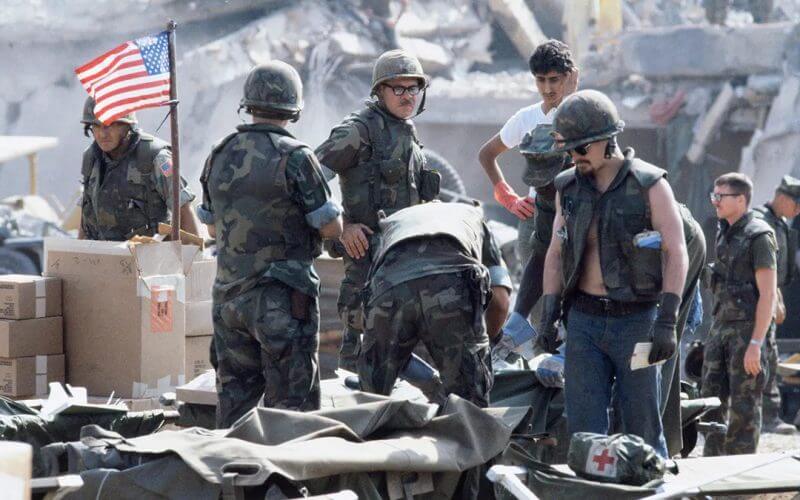Over the weekend, a representative of the Islamic Republic of Iran's Supreme Leader in Lebanon, Sayyed Issa Tabatabai, revealed new information about Tehran's role in the terrorist attacks against American and Israeli military and diplomatic personnel in the 1980s.
Translation from the Middle East Media Research Institute (MEMRI) revealed Tabatabai engaged in an interview with the Islamic Republic of Iran's State-run News Agency (IRNA) and told reporters that he went to Lebanon to provide resources needed to carry out "martyrdom operations in the place where the Americans and Israelis were."
Regarding Hezbollah, the Lebanese Shiite terrorist group, Tabatabai explained that the efforts to establish the group began in the Baalbek area, with major support from Iran's Revolutionary Guards Corps (IRGC).
"I had no part in establishing the [political] party [Hezbollah], but God made it possible for me to continue the military activity with the group that had cooperated with us before the [Islamic] Revolution's victory," he said.
Tabatabai also said that following the 1979 Islamic Revolution in Iran, Hezbollah was established in the summer of 1982.
"For two years, [Hezbollah's] military base was located in my home. The group [supporters of the Islamic Revolution] signed a contract declaring their willingness to become martyrs. Perhaps more than 70 [of them] signed this contract in my home," he said.
Tabatabai said that the founder of Iran’s Islamic Revolution, the Ayatollah Ruhollah Khomeini, and his successor current Supreme Leader Ali Khamenei placed great confidence in him and emphasized his connection with the current Supreme Leader in the "finance and the spread of the Shi'a."
“What he (Tabatabai) says can't be ignored,” explained Dr. Walid Phares, a foreign policy expert and author of ‘Iran an Imperialist Republic and US policy.’ Sayyed Tabatabai, senior representative of the ultimate leader of the Islamic of Iran, in Lebanon, is the most important representative of the Grand Ayatllolah Khamanei outside the country, because he is a direct ambassador from the Khomeinist regime to Hezbollah.”
According to Dr. Phares, by Tabatabai officially claiming that his regime provided all what is needed to Hezbollah and its networks to blow up the Marines barracks, the embassy and assassinate U.S. citizens, including military, the regime's envoy assumed the responsibility of his regime in the murders and massacres in Lebanon against United States interests, staffers and citizens between 1982 and 1990.
In response to Tabatabai's revelations, IRNA quickly removed the damaging information that Tabatabai made about Iran's role in the suicide bombings of Americans. MEMRI was able to preserve a copy of the interview.
Following the 1983 bombing of the American Embassy in Beirut, in which 63 people, including 17 Americans were murdered, and dual suicide truck bombers blew up the barracks of American and French members of a multinational force in Lebanon in the same year in which 220 United States Marines, 18 US Navy sailors, and three U.S. Army soldiers lost their lives, the Islamic Republic of Iran and its terrorist proxy Hezbollah have been blamed for the attacks.
“But in Lebanon, it was common knowledge not just that Iran supplied Hezbollah, it was the Islamic Republic that actually ordered the massacres. For decades leaders of Hezbollah, including the current secretary general Hassan Nasrallah, have openly stated that ‘their weapons, ammunition, money and more came from Iran.,” Dr. Phares said.
“This statement could have further impact on the rights of U.S. citizens, including Lebanese Americans, to take legal action against the Iran regime, which is now receiving another batch of $6 billion directed by the Biden administration to Tehran as part of a hostage exchange agreement.”
Despite the new revelations, Tehran continues to deny any role in the bombings. In 2001, following lawsuits filed by families of the hundreds of Americans killed or wounded in the bombings, Tehran submitted no defense against the allegations.
Today, the regime in Tehran continues to supply Hezbollah with financial and military resources against U.S. and Israeli forces, spreading its influence in the Middle East, Europe, and Latin America.
Related Story: Israel Warns Iran Building Airport in Southern Lebanon to Launch Attacks









